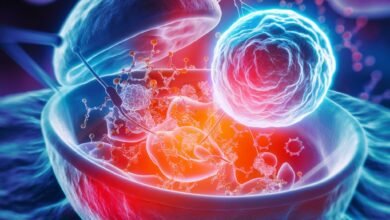Your Complete Guide to Eating for Hormonal Balance

Feeling tired, experiencing weight changes, or mood swings despite enough sleep could signal hormonal imbalances. Hormones regulate energy, metabolism, mood, and reproductive health, and any disruptions can impact overall well-being.
Understanding Hormonal Balance and Its Importance
Hormonal balance refers to the optimal levels and proper functioning of your body’s hormone system. Key players include insulin (blood sugar regulation), cortisol (stress response), thyroid hormones (metabolism), and reproductive hormones like estrogen and testosterone. When these chemical messengers work in harmony, you experience steady energy, stable moods, healthy weight management, and overall vitality.
Common signs of hormonal imbalance include persistent fatigue, irregular periods, unexplained weight gain or difficulty losing weight, mood swings, sleep disturbances, brain fog, and changes in appetite or cravings. These symptoms often develop gradually, making them easy to dismiss as normal parts of aging or busy lifestyles.
However, addressing hormonal imbalances early can prevent more serious health issues down the road and significantly improve your quality of life.
The Gut-Hormone Connection
Your gut microbiome—the trillions of bacteria living in your digestive system—plays a crucial role in hormone regulation. These beneficial bacteria help metabolize and eliminate excess hormones, particularly estrogen. They also produce neurotransmitters like serotonin, which affects mood and sleep patterns.
An unhealthy gut can lead to hormone recycling, where estrogen gets reabsorbed instead of eliminated, creating an imbalance. Poor gut health also increases inflammation throughout the body, which can disrupt hormone production and sensitivity.
Supporting your gut health through proper nutrition creates a foundation for hormonal balance. This means prioritizing fiber-rich foods, fermented foods, and avoiding processed foods that can damage beneficial bacteria, much like those interested in semaglutide in Salt Lake City seek foundational health improvements.
Foods to Include for Hormonal Balance
Cruciferous Vegetables
Broccoli, cauliflower, Brussels sprouts, and kale contain compounds called indoles that support healthy estrogen metabolism. These vegetables help your liver process and eliminate excess hormones more effectively. Aim for at least one serving daily, whether raw in salads or lightly steamed.
Healthy Fats
Avocados, olive oil, nuts, and seeds provide the building blocks your body needs to produce hormones. Omega-3 fatty acids from sources like wild salmon, walnuts, and flaxseeds help reduce inflammation and support hormone sensitivity. Include healthy fats at every meal to maintain stable blood sugar and hormone levels.
Fiber-Rich Foods
Beans, lentils, quinoa, and berries help eliminate excess hormones through regular bowel movements. Fiber also feeds beneficial gut bacteria and helps stabilize blood sugar levels. Women should aim for 25-30 grams of fiber daily, while men need 35-40 grams.
Protein Sources
High-quality proteins like grass-fed meat, wild-caught fish, organic eggs, and plant-based options provide amino acids necessary for hormone production. Protein also helps maintain stable blood sugar levels throughout the day.
Adaptogenic Herbs
Ashwagandha, maca root, and holy basil help your body adapt to stress and support healthy cortisol levels. These can be added to smoothies or taken as supplements under healthcare provider guidance.
Foods to Avoid for Hormonal Balance
Processed and Packaged Foods
These often contain preservatives, artificial additives, and trans fats that can disrupt hormone function. They also lack the nutrients your body needs for optimal hormone production. Focus on whole, unprocessed foods whenever possible.
Excess Sugar and Refined Carbohydrates
High sugar intake causes insulin spikes and increases inflammation, both of which can throw hormones out of balance. This includes obvious sources like candy and soda, but also hidden sugars in sauces, dressings, and processed foods.
Excessive Caffeine
While moderate caffeine consumption can be part of a healthy diet, too much can elevate cortisol levels and disrupt sleep patterns. Limit intake to 1-2 cups of coffee per day and avoid caffeine after 2 PM to protect your sleep quality.
Conventional Dairy and Meat
These products may contain added hormones and antibiotics that can interfere with your natural hormone balance. Choose organic, grass-fed, and hormone-free options when possible.
Lifestyle Tips for Hormonal Balance
Stress Management
Chronic stress elevates cortisol levels, which can suppress other hormones and create widespread imbalances. Incorporate daily stress-reduction practices like deep breathing exercises, meditation, or gentle yoga. Even five minutes of mindful breathing can help lower cortisol levels.
Smart Exercise Approach
Regular movement supports hormone balance, but excessive high-intensity exercise can actually increase stress hormones. Aim for a mix of moderate cardio, strength training, and restorative activities like walking or yoga. Listen to your body and adjust intensity based on your energy levels.
Prioritize Sleep Quality
Your body produces and regulates many hormones during sleep. Aim for 7-9 hours nightly and maintain consistent sleep and wake times. Create a calming bedtime routine and keep your bedroom cool, dark, and quiet for optimal hormone production.
Sample Meal Plan for Hormonal Balance
Breakfast: Vegetable scramble with organic eggs, spinach, and avocado, served with a slice of sprouted grain toast
Mid-morning snack: Green smoothie with berries, leafy greens, protein powder, and ground flaxseeds
Lunch: Quinoa bowl with roasted vegetables, grilled salmon, and tahini dressing
Afternoon snack: Apple slices with almond butter and a sprinkle of cinnamon
Dinner: Grass-fed beef stir-fry with broccoli and bell peppers over cauliflower rice
Evening: Herbal tea like chamomile or passionflower to support relaxation and sleep
This sample day provides balanced macronutrients, plenty of fiber, anti-inflammatory foods, and hormone-supporting nutrients throughout the day.
Conclusion
To support hormonal health, gradually incorporate hormone-supporting foods like vegetables, healthy fats, and quality proteins, while minimizing processed foods and sugar. Recognize that hormonal balance is an ongoing journey, and your needs may evolve.




